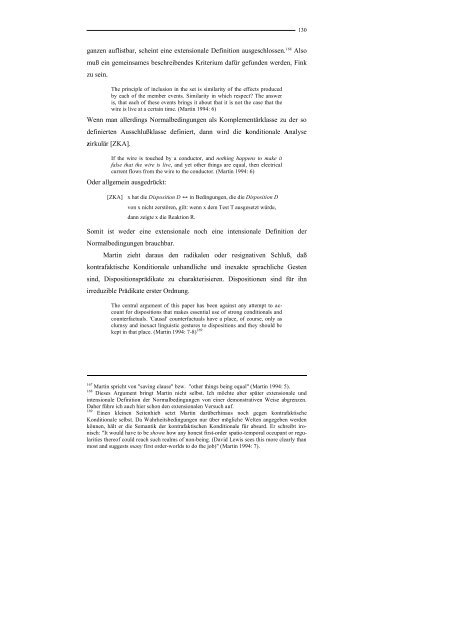Conditional Analyses.pdf - causation | laws | dispositions | explanation
Conditional Analyses.pdf - causation | laws | dispositions | explanation
Conditional Analyses.pdf - causation | laws | dispositions | explanation
Erfolgreiche ePaper selbst erstellen
Machen Sie aus Ihren PDF Publikationen ein blätterbares Flipbook mit unserer einzigartigen Google optimierten e-Paper Software.
130<br />
ganzen auflistbar, scheint eine extensionale Definition ausgeschlossen. 168 Also<br />
muß ein gemeinsames beschreibendes Kriterium dafür gefunden werden, Fink<br />
zu sein.<br />
The principle of inclusion in the set is similarity of the effects produced<br />
by each of the member events. Similarity in which respect? The answer<br />
is, that each of these events brings it about that it is not the case that the<br />
wire is live at a certain time. (Martin 1994: 6)<br />
Wenn man allerdings Normalbedingungen als Komplementärklasse zu der so<br />
definierten Ausschlußklasse definiert, dann wird die konditionale Analyse<br />
zirkulär [ZKA].<br />
If the wire is touched by a conductor, and nothing happens to make it<br />
false that the wire is live, and yet other things are equal, then electrical<br />
current flows from the wire to the conductor. (Martin 1994: 6)<br />
Oder allgemein ausgedrückt:<br />
[ZKA] x hat die Disposition D ↔ in Bedingungen, die die Disposition D<br />
von x nicht zerstören, gilt: wenn x dem Test T ausgesetzt würde,<br />
dann zeigte x die Reaktion R.<br />
Somit ist weder eine extensionale noch eine intensionale Definition der<br />
Normalbedingungen brauchbar.<br />
Martin zieht daraus den radikalen oder resignativen Schluß, daß<br />
kontrafaktische Konditionale unhandliche und inexakte sprachliche Gesten<br />
sind, Dispositionsprädikate zu charakterisieren. Dispositionen sind für ihn<br />
irreduzible Prädikate erster Ordnung.<br />
The central argument of this paper has been against any attempt to account<br />
for <strong>dispositions</strong> that makes essential use of strong conditionals and<br />
counterfactuals. 'Causal' counterfactuals have a place, of course, only as<br />
clumsy and inexact linguistic gestures to <strong>dispositions</strong> and they should be<br />
kept in that place. (Martin 1994: 7-8) 169<br />
167 Martin spricht von "saving clause" bzw. "other things being equal" (Martin 1994: 5).<br />
168 Dieses Argument bringt Martin nicht selbst. Ich möchte aber später extensionale und<br />
intensionale Definition der Normalbedingungen von einer demonstrativen Weise abgrenzen.<br />
Daher führe ich auch hier schon den extensionalen Versuch auf.<br />
169<br />
Einen kleinen Seitenhieb setzt Martin darüberhinaus noch gegen kontrafaktische<br />
Konditionale selbst. Da Wahrheitsbedingungen nur über mögliche Welten angegeben werden<br />
können, hält er die Semantik der kontrafaktischen Konditionale für absurd. Er schreibt ironisch:<br />
"It would have to be shown how any honest first-order spatio-temporal occupant or regularities<br />
thereof could reach such realms of non-being. (David Lewis sees this more clearly than<br />
most and suggests many first order-worlds to do the job)" (Martin 1994: 7).


